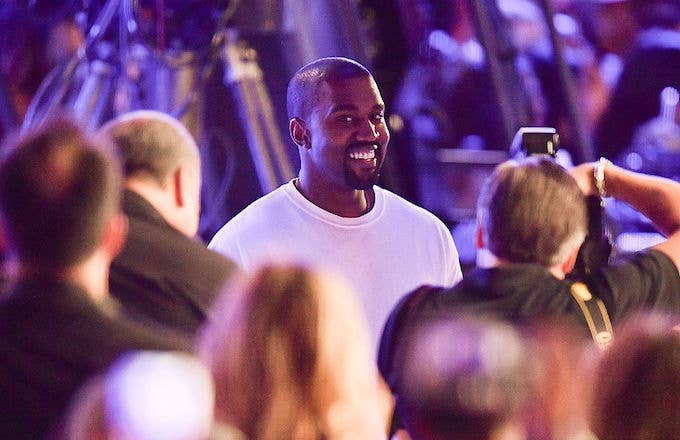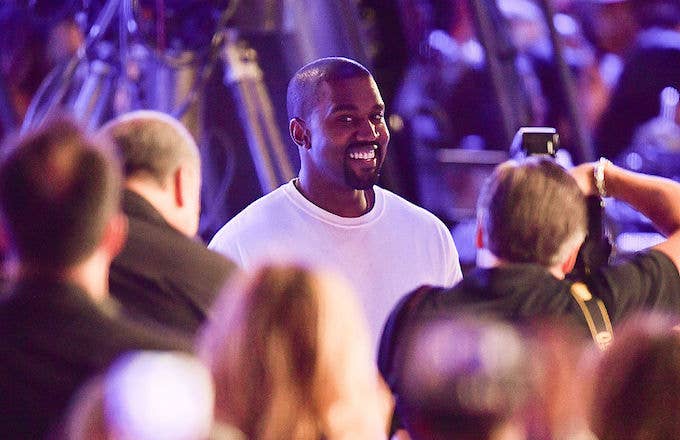
Thursday night, Kanye West gave the world a taste of his new album, ye. In typical Kanye fashion, it was a spectacle, with music journalists and media figures being flown to Wyoming via private jet to hear the album before its release, and new music apps being pushed on the general public for streaming purposes. The live stream, which was largely dedicated to camp fires and grazing horses, kicked off late, but nobody seemed to mind in the end. We were just ready for the music.
Once Kanye finally arrived at the Wyoming listening site, the session began. I was whelmed (not over or under) by the lyrics of track one—“I Thought About Killing You”—but the production caught my ear. Not bad, Ye. Track two, “Yikes,” was propulsive and driven by a perfect beat to get hyped to; I bopped along to it on my couch. Not bad at all, Ye.
But then, as the song neared its end, Kanye had something to get off his chest:
That's why I fuck with Ye
That's my third person
That's my bipolar shit, nigga what?
That's my superpower, nigga ain't no disability
I'm a superhero! I'm a superhero!
As soon as I heard the word “bipolar,” I screamed. Loudly. Because I fucking knew it.
I was diagnosed as bipolar I two years ago. (It involves alternating states of depression and full-blown mania, versus the less intense hypomania with bipolar II.) Since my very first episode in September 2016, I’ve been caught between two worlds: reality, and a heightened state of euphoria where anything is possible. As soon as Ye claimed bipolarism on “Yikes,” everything began to make sense.
The rest of the album played out, then played out again as Yeezy and the gang ran ye back. But the only thing on my mind was this very big admission, which entirely changed the way I see Kanye, and would likely change the way the rest of the world sees him.
When I woke up Friday morning, I grabbed my phone like a millennial and saw the album artwork for ye: A serene photo of the Wyoming landscape (which I would later find out Kanye shot on his way to the listening session). Over that image lay stark, neon green lettering: “I hate being Bi-Polar, its awesome.”
🚨 AND IT'S HERE 🚨
Listen to Kanye's new album, 'Ye' now: https://t.co/jJQMQgSqGo pic.twitter.com/cU9SD9tlOa
I hopped out of bed and immediately started pacing. Not only had one of hip-hop’s most influential figures stepped forward and admitted he “suffers” from the same condition as me—this man was in my head.
For the past two years, I’ve been trying to reconcile my feelings about being bipolar. On the one hand, I would rather not have to deal with meds, psychiatrists, hospitals, and nosey-ass people. On the other hand, I wouldn’t trade my bouts with mania for the world. To keep it a buck, being manic is the most incredible experience I’ve ever had. The terrible parts of being on this planet fade to the background and all you see are the great things, the possible creations that could change the world. Ideas come to you at hyperspeed, and it legitimately feels like the universe is conspiring to get you to where you need to be. There's even a word for that last part: synchronicity.
[mania] feels like being woken up by a higher power. It makes you feel like the chosen one.
For me, extreme mania came knocking when I was both off and on medication. Every time, it feels like being woken up by a higher power. It makes you feel like the chosen one. (Take “Ultralight Beam” for another spin with this in mind.) You’re wide open emotionally and you feel damn near everything. You become the ultimate empath. Mania is like a cheat code to instant, pure love and understanding. It links together everything you've ever experienced and colors your perspective on life well past the episode.
You hear every word, every sound in a new way. The simple act of listening to music—consuming any media, really—feels as though you're deciphering messages from God. Everything you hear and see wraps itself around you in a way that feels supernatural. It’s like being on a god-like level of existence. If that sounds familiar, it’s because in both interviews and in songs, Kanye has quite literally called himself a god. Now that I’ve experienced mania on varying levels, numerous times, I understand what he means. It feels like the universe is pushing every atom of energy directly into you, and you only, and you're floating above everyone else. But that’s the upside.
To use a cliche, being bipolar is a blessing and a curse. You have virtually no control over the disorder. When I had my first episode, it began as a deep depression, then skyrocketed into the very high territory of mania, which typically involves delusions of grandeur.
While manic, love feels like the most powerful source on the planet; it vibrates all around you. It feels like world peace is sitting in your heart and you have the opportunity to give it away to all who’ll listen. If that also sounds familiar, it’s because Kanye spent weeks on Twitter this year encouraging people to love and forgive one another, and stop moving out of fear. He even called Donald fucking Trump his “brother” and said he loved him. Ye’s effusive goal of empowering people through love makes a ridiculous amount of sense when you’ve mentally been where he was/is. But it doesn’t excuse the fact that he’s playing a dangerous game with the alt-right.
I love the way Candace Owens thinks
In April, Kanye tweeted, “I love the way Candace Owens thinks.” Thursday night, Owens, a notorious right-wing YouTuber, was in attendance at the listening session. Ye's goal of achieving universal oneness feels familiar—it’s the only thing I focused on during my first episode—but his ignorance of conservative politics and how they affect marginalized communities outweighs any aspirations of unity he might have. Everything in mania is open to interpretation, but there’s still a difference between right and wrong. While his intentions might be pure, we can’t ignore the fact that our present reality requires us to fix some things before we all jump into bed together.
People have long called Kanye crazy. Even as recently as a month ago, the word was strewn across social media when he controversially said slavery was a choice. Kanye, who will be 41 on June 8, told Big Boy he was officially diagnosed with a “mental condition” at age 39—the same age he was on his short-lived Saint Pablo Tour. It was there that his meandering, eyebrow-raising rants foreshadowed a hospitalization for “exhaustion.” In his May interview with Charlamagne tha God, Kanye finally faced the “crazy” descriptor head on.
"I want to change the stigma of crazy and the stigma of mental health, period... Best believe I'm going to take the stigma off of the word 'crazy.'"
By calling his bipolarism a superpower and not a disability, Kanye is taking power away from the diagnosis and choosing to lean into what he sees as a good thing. It’s something I’ve been tip-toeing around for months, myself: not seeing it as a mental illness, but as a slightly damaged gift. A special way of operating. By introducing a positive narrative of bipolar disorder with this album, he’s helping others diagnosed with the condition to see it that way, too.
if Kanye say my bipolar disorder is a superpower then gahdammit it's a superpower
Kanye calling Bipolar his superpower was inspiring.
But not everybody is feeling Ye’s declaration.
As someone with bipolar disorder, Kanye’s depiction of it on his album is cheap & not translated well.
Never once in my 19 years of living has a manic or depressive episode turned me full MAGA. It’s a weak artistic concept & no amount of soul samples can make me think otherwise
Kanye's album doesnt represent bipolar disorder accurately. He describes mania as a superpower as if everyone understands the context he gives. Mania can be debilitating and its agony wondering if youre happy or manic. You cant enjoy moods.
I can understand why. Not everyone experiences bipolarism in the same way, and many, many people have likely been put through the ringer because of it—myself included. I wouldn’t wish being bipolar on anyone: I’ve gone missing, been hospitalized twice, and had embarrassing lapses in judgment, both publicly and privately. But I don’t wish it never happened to me. It’s genuinely enhanced my life, and showed me that we can greatly improve our communication with, and understanding of, each other.
Despite my general openness to Ye’s perspective of bipolar disorder, I do have pause. I worry people will claim to be bipolar, just to follow in his footsteps. I worry that people who do actually have the condition will think Kanye is damaging its public perception. Kanye is one of, if not the most prominent figure in contemporary pop culture to admit he’s bipolar. Not only that, Ye has provided a frame of reference that previously didn’t exist in our world. He’s drawing up a blueprint in real time that can show people a new, potentially groundbreaking way to look at a long-misunderstood condition.
But if Kanye really wants to change the way we think about mental health, his next steps mean everything. He should continue to speak out loud about the unexpected intricacies of his diagnosis, because it will give people like me the space to speak our own truths. Most importantly, through the next days, weeks, months and years: he can’t take a detour from this perspective. If he sees this through, the conversation around mental health could be in for a revolutionary change.

